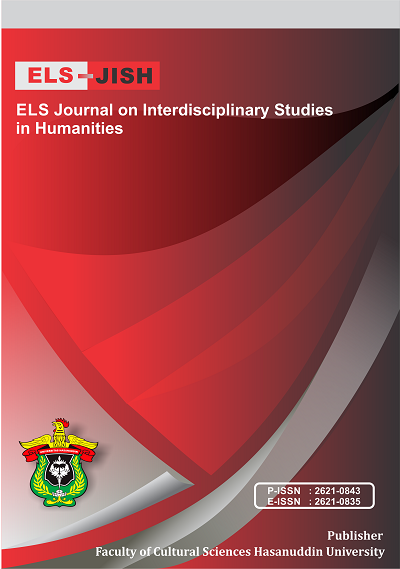The Development of Portfolio Evaluation Tools to Improve Expository Writing Skills
DOI:
https://doi.org/10.34050/elsjish.v5i2.21186Keywords:
Portfolios, Assessment, R&D Research, Writing SkillsAbstract
This research is intended to help English teachers both at the college and high school levels in using portfolios as an evaluation tool in writing skills. Portfolio assessment was chosen in this research because of its wide use and easy adaptation to various needs. This study used Research and Development method. The development stage is based on the IQF curriculum implemented in English Language and Literature Department, Universitas Negeri Surabaya. The exploratory writing skills held for students are expected to help them in further writing, namely Thesis Proposal Writing and Academic Journal Writing where students will write down their thoughts about a concept or phenomenon and present an explanation accompanied by adequate research data. The results of the study show that the use of portfolio is quite positive. There is an improvement in students’ writing after applying a portfolio as an evaluation tool for writing skills. However, some additions need to be made to improve the quality and format of the portfolio as an evaluation tool for writing skills.
References
Arjulayana, arjulayana, Rafli, Z., & Ansoriyah, S. (2018). Understanding Natural Approach for Teaching Productive Skills. ELS Journal on Interdisciplinary Studies in Humanities, 1(2), 232-239. https://doi.org/10.34050/els-jish.v1i2.4355
Alwasilah, A. C. (1999). Empowering College Students Writers through Collaboration. UPI. Bandung
Brown, H.D. (2001). Teaching by Principles: An Interactive Approach to Language Pedagogy. Longman. USA
Dantes, N. (2008). Hakikat Assesmen otentik Sebagai Penilaian proses dan Produk dalam Pembelajaran Yang Berbasis Kompetensi. Singaraja: Universitas Pendidikan Ganesha.
Flower & Hayes. (2008). A Cognitive Process Theory of Writing. National Council of Teacher of English
Gebhard, Jerry G. (2000). Teaching English as a Foreign or Second Language: A Teacher Self-development and Methodology Guide. Michigan: University of Michigan.
Hyland, Ken. (2007). Second Language Writing. New York: Cambridge University Press
Nur Intan Ode, M., & Suherman, L. O. A. (2022). Developing Student Motivation Through Scientific Writing Learning Guidance. Room of Civil Society Development, 1(1), 70–74. Retrieved from https://rcsdevelopment.org/index.php/rcsd/article/view/9
Prihandoko, L. A., Anggawirya, A. M., & Rahman, F. (2021, December). Students’ Perceptions Towards Autonomous Learners Concept in Academic Writing Classes: Sequential Mixed-Method. In International Joined Conference on Social Science (ICSS 2021) (pp. 487-491). Atlantis Press.
Rahman, F., Abbas, A., Hasyim, M., Rahman, F., Abbas, A., & Hasyim, M. (2019). Facebook Group as Media of Learning Writing in ESP Context: A Case Study at Hasanuddin University. Asian EFL Journal Research Articles, 26(6.1), 153-167.
Sugiyono. (2010). Metode Penelitian Pendidikan Pendekatan Kuantitatif, kualitatif, dan R&D. Bandung: Alfabeta
Shields, M. (2010). Essay writing: A student’s guide. London: SAGE Publications.
Sofie, M. S., Iye, R., Abida, F. I. N., Bugis, R., Musyawir, M., & Yulismayanti, Y. (2022). The Effectiveness of Online Learning on Buru State High School Students on Learning Achievement in Covid-19 Situation. ELS Journal on Interd
Zamel, Vivian. (1985). Responding to Students’ Writing. TESOL Quarterly Vol. 19, No: 1, hal: 79-101.
Downloads
Published
How to Cite
Issue
Section
License
Copyright (c) 2022 Rahayu Kuswardani, Fithriyah Inda Nur Abida, Oikurema Purwati, Nur Fauzia, Diana Budi Darma, Fahri Fahri, Nur Chakim, Muh Aries Hilmi

This work is licensed under a Creative Commons Attribution-NonCommercial-ShareAlike 4.0 International License.






